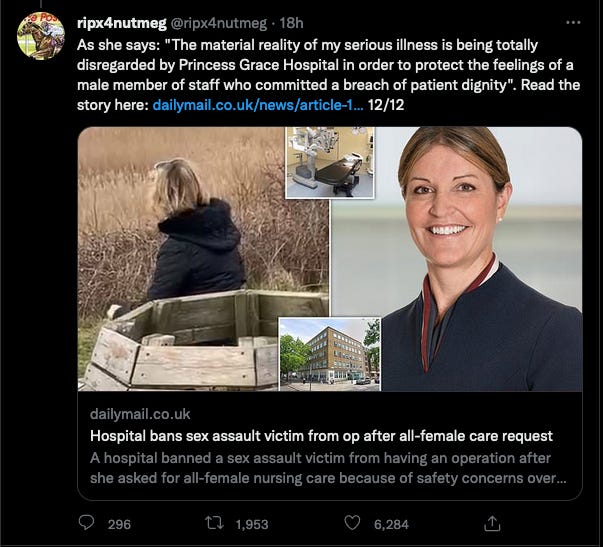Several of you sent me a story out of the UK and asked me to comment on it, from my perspective as someone who has PTSD in part as a consequence of sexual assaults, and as someone who has written several times about individual responsibility, including to overcome trauma triggers.
A woman who is a survivor of sexual assaults asked for an all-female team after a scheduled colorectal surgery. The hospital (a private one, which specializes in women’s healthcare) has canceled the surgery, which could end up being a death sentence. Here is a Daily Mail story, as well as the Twitter link and here are screenshots from Twitter:
Trans activists have responded to this story with viciousness and vile, open glee at the woman’s suffering, and outright lies, like that she asked for all “cis” people, not all female people, taking care of her after the surgery. I’m not linking to their bullshit, as it’s very easy to find on Twitter, but here’s just one screenshot.
This is (Partly) Why Language Matters
The word “triggered” has been colloquially re-defined to mean upset. In the case of PTSD, being triggered is much more than being upset. In fact, being PTSD-triggered can involve states that look, from the outside, almost nothing like being emotionally upset.
I am going to use the word “triggered” in the rest of this piece in the PTSD sense, the sense of having the physical and physiological consequences of the anxiety disorder, PTSD, activated in a person’s body. These include but are not limited to flashbacks (which can be emotional, sensory, or both), elevated blood pressure, altered perceptions of pain, sleep disturbances, inability to think or focus, disassociation (which can include the inability to fully understand or even recognize what’s happening with one’s body), emotional numbness and/or emotional volatility, exaggerated startle reflexes, and being easily adrenalized.
This woman did not ask to avoid being “triggered” in the sense of being upset. She was asking the hospital to enable her to avoid being triggered during her recovery—in the sense of avoiding post-trauma reactions. This is not just a reasonable request; in my opinion, the hospital denying it would result in their being guilty of medical malpractice.
Why The Woman’s Request Matters: Medically
In the aftermath of major surgery, vital signs provide crucial information, and so do other aspects of how a patient functions during recovery. Respiration, blood pressure, temperature, perception of pain, ability to answer questions—all of these matter and all of them can be affected by PTSD.
Immediately after surgery, patients are often on morphine pumps or other pain management regimens that impair the ability to think clearly, which makes vital signs matter even more. A woman whose PTSD is triggered by having males take care of her intimate physical needs will produce vital signs that give doctors inaccurate information. They will have no way of knowing if her elevated blood pressure, as just one example, is a consequence of the procedure, post-surgery meds, or PTSD.
I recently spent several days fully PTSD triggered. (The situation I referred to in my most recent essay resolved earlier than expected, thank goodness, and I am much better today.) During that time, my perception of pain was affected, which I know because my usual need for tylenol first thing in the morning (to deal with my shoulder and other chronic pain) changed, due to disassociation. My respiration was affected, which I know without having had a nursing staff measure it because I got out of breath more easily than usual.
My ability to focus and sleep were both shattered.
Absolutely any cognitive test that a doctor might have done to assess my ability to remember, answer questions, etc., would have resulted in a compromised finding. If I had needed medical treatment during that time, the fact that I was dealing with a state of being actively PTSD triggered would have been crucial information. I would have been asking for doctors to provide me with absolutely everything in writing so that I could read it later, when my brain was fully available to me again.
In the immediate aftermath of surgery, avoiding PTSD triggers is crucial to enable proper physical recovery. The hospital absolutely has a responsibility to enable her to physically recover to the best of its ability. Having female staff available for a scheduled procedure is an eminently reasonable request, particularly for a hospital that specializes in women’s healthcare.
Morphine Pumps Produce Major Vulnerability
My experience with anesthesia and morphine pumps is that they both cause the rational mind to not be in command. When I wake up from anesthesia, it takes quite awhile for me to recover full rational control. I am extremely careful about things like who drives me home from a medical procedure that requires anesthesia.
Morphine pumps are worse. So much worse. They produce almost unimaginable vulnerability. A friend’s grandmother sat with me in the hospital for several days when I was on a morphine pump, post-surgery. (This surgery was far less serious and complex than the one needed by the UK woman, so it’s a fair assumption that she would be in severe pain and require a morphine pump after her own procedure.) I don’t even remember her being there at all, but I know that I told her basically everything about my life. She’s passed away since, but she was the first person who knew many, many things about me. I know this only because she came to me when I was recovered to tell me that she was praying for me to overcome my childhood and to promise me that she would never repeat anything I had told her, including to her grandchild. I was stunned that I had told her anything at all, but I know that I did. She gently repeated enough details to convince me, because I sat there refusing to believe her, saying things like, “I’m sorry, Mrs. W, but I never talk about my childhood, so I’m not sure what you’re talking about.”
If I had not been on a morphine pump? I could have been presented with the choice of telling that sweet, trustworthy grandmother all my secrets, with the promise that they would die with her, or being tortured to death and I’d have chosen the latter without hesitation.
On a morphine pump, I not only told her everything, I don’t even remember doing so.
That is how powerfully vulnerable being on a morphine pump can render a trauma survivor.
Why The Woman’s Request Matters Psychologically
Everyone has the responsibility to overcome trauma triggers. Nobody is clearer on this than I am. However, this is not something that can be done on a linear timeline. It doesn’t work on a schedule. Some of mine were overcome much more easily than others. Some I am still working on. Trauma recovery is a bitch, and it takes what it takes, in both time and insight.
A life-saving surgery for a medical problem is not something that can be scheduled. Spending an extended period of time in the hospital in the physiological state of being triggered is likely to cause her an enormous psychological setback. Having that much control taken from her, on the choice of being forcefully re-traumatized or dying, would be crushing. It may result in her not being able to ever fully recover.
How I Handle This
For procedures that don’t require removing clothing, I have no difficulty having male healthcare providers. This is a measure of real progress for me; there was a long time when I did have difficulty.
When a medical procedure requires taking clothing off, I prefer female providers—as old as possible, both to invoke the grandmotherly feeling of safety and to increase the likelihood that she was educated before Wokeness took over medical education. My chart in the local hospital states this preference, and I have never had even a little bit of trouble from the hospital around it for any scheduled procedure. This may be because the Americans with Disabilities Act requires reasonable accommodations, and a female healthcare provider for a female patient with PTSD is quite reasonable. UK citizens do not enjoy the protections of the ADA, of course. I wish they did.
On the rare (emergency, non-scheduled procedure) occasions that I have been forced to have a male provider, they have been completely understanding. They bring a female nurse or staffer. They do not react with shaming or impatience when my vital signs are screwed up and I say something like “My blood pressure is normally more like 110/70; it’s high right now because my PTSD is triggered by being undressed with a male in the room.” They patiently repeat things and/or write them down. They don’t take it personally because they are professionals whose goal is patient care, not personal validation.
The Ultimate Goal
As with all my other trauma triggers, I want to overcome this one. It is something I am working on. Until I am able to get there, if I need intimate physical procedures in a healthcare setting, I will continue to request female providers. That is my right as a patient, and it is my right as an American protected by the Americans with Disabilities Act.
The woman in the UK who is being faced with this has been clearly told that her needs come second to the hospital’s desire to virtue-signal its belief in the unscientific mantra that transwomen are women.
She is not protected by the ADA.
She may die as a consequence of speaking up for herself and advocating for what she needs to recover from surgery with the comorbidity of PTSD.
It may be that, in the end, the men who committed the sexual assaults inadvertently killed her, aided and abetted by the Woke leftists who prize the right of men to declare themselves women above anyone else’s needs.
This is tragic, and sad.
The lunacy of this situation—an unscientific movement to pretend that humans are not a sexually dimorphic species having so fully taken over healthcare—was entirely preventable.
Speaking the truth matters.
Housekeeping: Now through Halloween, paid subscriptions are 10% off: link here. Comments are open for paid subscribers. Email hollymathnerd at gmail if you want to participate but can’t afford a paid subscription. I’m no longer on any social media, so your spreading the link to anything you enjoy reading here is helpful and appreciated. Thank you!












The height of privilege, the tip of the "oppression Olympics pyramid" is the hospital chose to forgo a very expensive procedure, waste all those professionals' time, so possibly one nurse's feelings don't get hurt.
Hospitals are notorious for acting in vengeful ways towards patients in the best of circumstances
Thank you so much for this. I also have PTSD from sexual assault and I request female dentists because of it. Sounds crazy right? Yet I have been triggered having a root canal done. Think about it. You're laying on your back in a chair, man over you, pain, bright light, can't move.... Yikes. Next thing I know I can't breathe, I'm in the corner and vomiting. The dentist called in staff he was frightened and didn't know what I would do. It was embarrassing as all hell.
I can't imagine being told I was a transphobe for not wanting to experience something like that again.